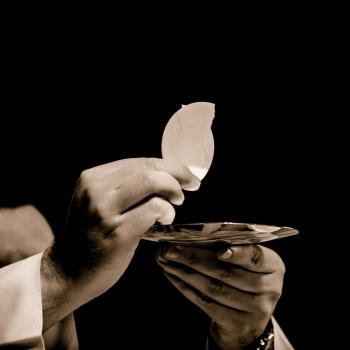In recent years, there have been a string of writers who have acknowledged the leavening influence of the Christian tradition on the western world but who are careful to make it clear that they are not Christians. It is hard to know where the trend began.
Tom Holland, author of the book, Dominion, began his journey while doing work research for his lengthy tome. Trained as a historian of the Greco-Roman period, Holland believed that the values which sustain western civilization originated with the Greeks and Romans.
It was only after he began his work that he discovered he couldn’t make the argument stick – that, in fact, the values that truly made the western world different, came from the church and, more broadly, the Judeo-Christian tradition. Early on Holland stated that he hadn’t “become a believer in Christ, per se, but he had become a believer in the necessity of Christianity.” More recently, he has begun going to church. (His mother was an Anglican.) But he is evidently nowhere near calling himself a Christian.
Similarly, Jordan Peterson, a Canadian psychologist and academic argues that the biblical story provides the key to understanding the challenges that human beings face in navigating life in a fulfilling fashion. In fact, he believes that the biblical story is so fundamental to human flourishing, that he has spent a considerable amount of time lecturing on the meaning and significance of the Bible. But when asked if he is a Christian, his response is always, “Not in the sense that you mean”.
In a different but similar vein, Bret Weinstein, an evolutionary biologist argues that Christianity is “literally false and metaphorically true”. And, self-declared atheist, Richard Dawkins has begun calling himself “a cultural Christian” in response to what he believes is the frightening rise of fundamentalist Islam in the UK. Dawkins is delighted with the decline of the church but he believes its values are a bulwark for the survival of the Western world.
So, what are those of us who do call ourselves Christians supposed to make of this development?
One: Let’s keep these developments in perspective. All too often Christians celebrate news of this kind in an indiscriminate manner. We chase after celebrity endorsements and conversions. In the final analysis, the observations all four scholars make are interesting. One might even argue that they are involuntary witnesses to what Christians have long argued is important about the message we have shared with the world. But ultimately an appeal to Holland, Peterson, Weinstein, Dawkins, or anyone else is the weakest of all arguments: the appeal to authority.
Two: Let’s be sure to do our own homework. The deep theological and critical work that has been done by Christians down through the centuries has been central to the leavening influence of the church. But, arguably, we do not do enough of it today. We no longer require the same rigor to complete a Masters of Divinity that was once requisite for that kind of work. The decline in the number of clergy available has put pressure on the church to find a quick fix for the problem that entails a modicum of preparation. And the administrative and bureaucratic tasks associated with “doing church” has forced reflection to the margins of the church’s life. That has to change.
Three: Let’s be faithful. The church’s impact on the world is not the product of one generation or even two. It is the product of over two thousand years of faithful effort; and the testimony of people like Holland, Peterson, Weinstein, and Dawkins ought to be sobering. The influence of Christianity to which they point is not the product of anything that the church has done in the last century or in this one. It is the product of what Eugene Peterson described as “long obedience in a single direction”.
Four: Let’s also take note. If people outside the church are arguing that the church’s teaching has provided a bulwark for civilization that is quickly failing, then they are also noting that we are losing the thread. That may have to do with a number of factors and many of them may be beyond our control. But as engagement with the life of the church begins to fail in the West, we also need to take responsibility for our part in that failure. Instead of presuming on the gifts of the past, characterizing our failures as simply part and parcel of a brave new world, or wringing our hands over the challenges of modern ministry, we should be praying for renewed energy and fresh insight.
Five: One assumption all four scholars make is deeply flawed. In the final analysis, we cannot have the benefits of Christianity without the church and without the practice of the Christian faith. People can talk all they want about the tenets and values of Christianity. They can talk about their importance and their centrality to a culture that values the dignity of all human beings, comes alongside the weak, and believes in the power of sacrifice.
But those values are grounded in baptism, worship, spiritual practice, and service; and both the attractive and transformational power of the Gospel lies in a relationship with the living Christ. That is why it has never been enough to argue in utilitarian or pragmatic terms that Christianity has a value that renders its faith commitments an irrelevance. And that is why no church has ever managed to thrive, predicated on the notion that its teaching is “literally false and metaphorically true.” It is only when the Gospel makes the same claims on the life of its adherents, just as it did on the lives of the First Twelve, that it has the kind of impact that it has had for over two thousand years.
Any other case for Christianity is an invitation to try living on the fumes.
















